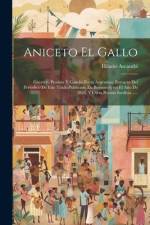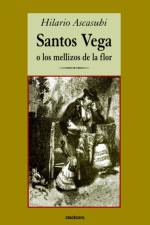av Hilario Ascasubi
381
In spite of the precedent of Bartolomé Hidalgo's "Cielitos y Diálogos patrióticos" -that defined the " cielito" as the tone of voice for the "gauchesca" genre- it is Hilario Ascasubi who should be considered the first of the "gauchi-poetas", as his works opened the roads to Estanislao del Campo's "Fausto" (1866) and José Hernández's "Martin Fierro" (1873).Santos Vega o los mellizos de la Flor was started in 1850, and published for the first time in 1851 in Montevideo as two deliveries of just 10 chapters spanning 1,080 versesIt is just in 1872 that Ascasubi, during his stay as diplomat in París, completes the sixty five chapters and more than 13,000 verses.In the author's own words: "the canevas of the Mellizos de la Flor, is a favourite subject of the argentine gauchos, it is the story of a maverick capable of every conceivable crime that gave the justice a handful. By referring his deeds and criminal life through Santos Vega, the wandering troubadour and country folk myth I also wanted to consecrate, the opportunity is happily fit to sketch the daily life of the Estancia and its inhabitants, as well as to describe the countryside most peculiar customs along with some traces of the city life".Based on the original 1872 complete text first published in Paris and printed by Imprenta de Paul Dupont, our edition adds to the author's own to complete no less than 803 lexicographic notes, conveniently placed at the bottom of the pages and intended to help the modern reader grasp the exact meaning of the text without obtrusive lengthy interruptions.These notes were made after a careful research work that includedRamón R. Capdevila 1700 refranes, dichos y modismos (región central bonaerense), Ed. Patria, Bs. As. 1955; Emilio Solanet Pelajes Criollos, Ed. Kraft, Bs. As. 1955; Tito Saubidet Vocabulario y refranero criollo, Ed. Kraft, Bs. As. 1943 Eleuterio F. Tiscornia Edición crítica de Poetas Gauchescos, , Ed. Losada, Bs. As, 1940 José Gobello Ascasubi lexicógrafo, , Marcelo Oliveri Editor, Bs. As. 2003 Juan Carlos Guarnieri, Diccionario del leguaje campesino rioplatense, Editorial Florencia & Lafon, Montevideo 1968 Daniel Granada, Vocabulario rioplatense razonado, Imprenta Rural, Montevideo 1890



